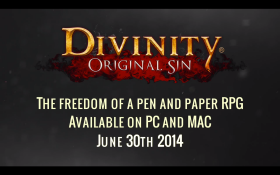
Divinity: Original Sin - Enhanced Edition Review
One of the things I love about the role-playing genre is the ability to design a character, taking care to think up their skills, backstory and personality, even though these elements are not necessarily representable within the game world. Divinity: Original Sin goes to great lengths to make the player feel as though they are manipulating people rather than pixels, and brings a huge amount of freedom to the table that simply isn’t there in other games.
The player is granted two customisable witch hunters at the very start that will go on to make up a party of four once the player finds some suitable candidates. Although the visual customisation is teeth-grindingly basic, the class systems are fantastically intricate, prompting the player to either choose their starting equipment and attributes from a wide variety of presets, or design a whole new one based on their preferences and strategic knowledge. This allows newer players to simply select the archetype that they are most used to playing as, while the more experienced ones can spend lifetimes optimising the best possible builds they can come up with. Thankfully, Divinity goes the Skyrim route, and allows the player to adjust or completely change their class as they see fit; I got bored of my crossbow, and now I shoot fire from my eyes.
This fluidity doesn’t stop here, as the player is given intimate access to each of their party members, allowing them not only to adjust their attributes and equipment, but where they are in the worldspace. With the grouping mechanic, the player can force one of their party members to split off from the rest and scout out an area, or break into an NPC’s living quarters while the rest of the party keeps them distracted. If you feel as though you should be able to do something in the game, chances are that you can; chests, doors and traps can be disarmed and unlocked, but they can also be destroyed with a spell or weapon blow, and the player never loses out on valuables or experience for doing so.
The single most impressive element to this game is the customisation that the player has over the personality of their heroes, something that I have never seen integrated quite as skilfully before. Whenever a decision needs to be made or a significant event occurs, both of the protagonist’s points of view are taken into account. I was quite stunned when I was dragged into a conversation between my heroes, while the game drove me to give a voice to both of them as though they were two completely different people. This has led to the rather comic adventures of my two hunters that simply can’t agree on anything and, by rights, really shouldn’t have been put together as a team. Small details like this excite me to no end, as I am fully immersed in a world populated by characters that react in ways that I would want, rather than how a short-sighted developer may have imagined they would.
Divinity ensures that the world the game is taking place in feels real to the player, and the environment is one of the key ways that this is done. Skills and spells can be used outside of combat, and can be employed to overcome the numerous hazards that the party will come across. Whenever dangerous surfaces, such as flaming oil or pools of poison, present themselves, the player is able to use their knowledge to inventively come up with solutions to deal with them. Of course, this carries over into the turn-based combat, which can be both a blessing and a curse. Once my rivals are defeated, I’m able to save up my healing potions for my vampiric character, as she can use the spilled blood of my fallen enemies, while I can create a border of lightning around my party before combat starts to offer some rudimentary protection. However, this can mean that victory is just as deadly as defeat; after defeating a horde of zombies, the game went back to being real-time, with the poison effects carrying over and killing my party before I was able to heal them. This kind of defeat is incredibly demeaning, and feels almost like an oversight on the part of the developers; my bumbling use of the inventory shouldn’t spell a death that could have been avoided had I still been in combat.
Another issue I had playing this game was simply bringing myself to complete basic quests; objectives are poorly defined, player movement is slow and often clunky and I am always left either banging my head against a wall or getting bored and looking for something more interesting to do. Don’t get me wrong, I love puzzles, but when I’ve spent hours walking (and it is never faster than a walk) from one NPC to another only to be told that I don’t have enough convicting evidence to complete my quest, I’d really just rather the murderer got away with it.
I love Divinity’s jovial feel and brilliant attention to player experience. Technically, it’s fun to play and thoroughly enjoyable, while the emphasis on player-choice rings through as being a well-thought out mechanic that the rest of the game was based upon. Yes, the story has failed to grab my attention, and I have suffered far more deaths than were actually my fault, but it all adds up to a commendable RPG that stands out from the crowd.
Divinity: Original Sin (Reviewed on PlayStation 4)
This game is good, with a few negatives.
Quirky, fun and with a tight focus on player freedom, Divinity: Original Sin stands out as one of the more interesting RPGs, even if it lacks the story to match.









COMMENTS